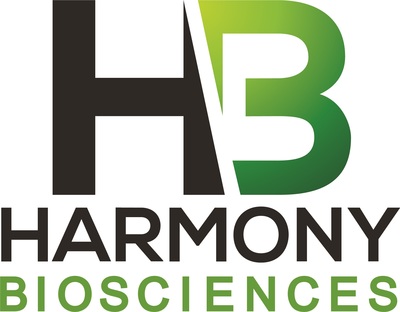Harmony Biosciences Initiates A Phase 2 Clinical Trial In Myotonic Dystrophy
Rhea-AI Summary
Harmony Biosciences Holdings (Nasdaq: HRMY) announced the initiation of a Phase 2 clinical trial to evaluate the safety and efficacy of pitolisant for excessive daytime sleepiness (EDS) and non-muscular symptoms in adult patients with type 1 myotonic dystrophy (DM1). Approximately 135 patients will receive low-dose, high-dose, or placebo pitolisant in a randomized study. The trial aims to address significant unmet medical needs as there are currently no approved treatments for DM1. Topline results are expected in the second half of 2022.
Positive
- Initiation of Phase 2 clinical trial for pitolisant in type 1 myotonic dystrophy.
- Potential to address significant unmet medical needs in a patient population with no approved treatments.
- Plans for long-term safety assessment following the randomized trial phase.
Negative
- No approved treatments currently available for myotonic dystrophy, indicating reliance on trial outcomes.
News Market Reaction 1 Alert
On the day this news was published, HRMY declined 0.68%, reflecting a mild negative market reaction.
Data tracked by StockTitan Argus on the day of publication.
PLYMOUTH MEETING, Pa., June 29, 2021 /PRNewswire/ -- Harmony Biosciences Holdings, Inc. ("Harmony") (Nasdaq: HRMY), a pharmaceutical company dedicated to developing and commercializing innovative therapies for patients living with rare neurological disorders who have unmet medical needs, today announced initiation of a Phase 2 clinical trial to evaluate the safety and efficacy of pitolisant for excessive daytime sleepiness (EDS) and other non-muscular symptoms in adult patients with type 1 myotonic dystrophy (DM1).
"In addition to the primary symptoms of myotonia and muscle weakness in patients with type 1 myotonic dystrophy, the non-muscular symptoms of excessive daytime sleepiness, fatigue, and cognitive dysfunction are very common in these patients and have a negative impact on daily functioning as much as, or more so, than the primary muscle symptoms of the disease," said Harmony's Chief Medical Officer, Jeffrey Dayno, M.D. "Pitolisant's novel mechanism of action increases histamine transmission in the brain which provides the scientific rationale for its potential clinical utility for the common non-muscular symptoms in patients with DM1. We listened to the needs of patients and caregivers in the myotonic dystrophy patient community and are pleased to have initiated this Phase 2 clinical trial to assess the potential clinical benefit of pitolisant in patients with this rare neurological disease, for which there are currently no approved treatment options."
Myotonic dystrophy is the most common form of adult-onset muscular dystrophy. It is a genetic disorder inherited in an autosomal-dominant pattern. Latest estimates suggest a prevalence of about one per 2,100 people with the genetic defect for DM1, which is the most common form of this disorder. This equates to about 160,000 people in the U.S. with the genetic defect for DM1. Estimates suggest there are 40,000 people currently diagnosed with DM1 in the U.S., with up to
The Phase 2 clinical trial is a randomized, double-blind, placebo-controlled study designed to assess the safety and efficacy of pitolisant in patients with DM1 ages 18 – 65 years. Approximately 135 patients will be randomized at baseline to low-dose pitolisant, high-dose pitolisant, or placebo in a 1:1:1 treatment ratio titrated over three weeks, followed by eight weeks of stable dosing. Patients who complete the randomized, controlled phase of the trial will be eligible to participate in an open-label extension phase to assess the long-term safety and effectiveness of pitolisant in patients with DM1.
The primary objective of the trial is to evaluate the effect of pitolisant compared with placebo on EDS. Secondary objectives include assessments of fatigue, specific measures of cognitive function using validated computer-based assessments, and overall disease burden utilizing a disease-specific, patient-reported outcomes instrument for DM1. Topline results are anticipated from the Phase 2 trial in the second half of 2022.
Pitolisant is marketed as WAKIX® in the U.S. for the treatment of EDS or cataplexy in adult patients with narcolepsy.
About WAKIX® (pitolisant) Tablets
WAKIX, a first-in-class medication, is approved by the U.S. Food and Drug Administration for the treatment of excessive daytime sleepiness or cataplexy in adult patients with narcolepsy. WAKIX has been commercially available in the U.S. since Q4 2019. It was granted orphan drug designation for the treatment of narcolepsy in 2010, and breakthrough therapy designation for the treatment of cataplexy in 2018. WAKIX is a selective histamine 3 (H3) receptor antagonist/inverse agonist. The mechanism of action of WAKIX is unclear; however, its efficacy could be mediated through its activity at H3 receptors, thereby increasing the synthesis and release of histamine, a wake promoting neurotransmitter. WAKIX was designed and developed by Bioprojet (France). Harmony has an exclusive license from Bioprojet to develop, manufacture and commercialize pitolisant in the United States.
Important Safety Information
WAKIX is contraindicated in patients with known hypersensitivity to pitolisant or any component of the formulation and in patients with severe hepatic impairment. WAKIX is extensively metabolized by the liver and there is a significant increase in WAKIX exposure in patients with moderate impairment.
WAKIX prolongs the QT interval. Avoid use of WAKIX in patients with known QT prolongation or in combination with other drugs known to prolong the QT interval. Avoid use of WAKIX in patients with a history of cardiac arrhythmias, as well as other circumstances that may increase the risk of the occurrence of torsade de pointes or sudden death, including symptomatic bradycardia, hypokalemia or hypomagnesemia, and the presence of congenital prolongation of the QT interval.
The risk of QT prolongation may be greater in patients with hepatic or renal impairment due to higher concentrations of pitolisant; monitor these patients for increased QTc. Dosage modification is recommended in patients with moderate hepatic impairment and moderate or severe renal impairment. WAKIX is not recommended in patients with end-stage renal disease (ESRD).
In the placebo-controlled clinical trials conducted in patients with narcolepsy with or without cataplexy, the most common adverse reactions (≥
Please see the Full Prescribing Information for WAKIX for more information.
About Harmony Biosciences
Harmony Biosciences is a pharmaceutical company headquartered in Plymouth Meeting, PA. The Company was established by Paragon Biosciences, LLC, with a vision to provide novel treatment options for people living with rare neurological disorders who have unmet medical needs. For more information on Harmony, please visit the company's website: www.harmonybiosciences.com.
Forward Looking Statement
This press release contains forward-looking statements within the meaning of the Private Securities Litigation Reform Act of 1995. All statements contained in this press release that do not relate to matters of historical fact should be considered forward-looking statements, including statements regarding our product WAKIX. These statements are neither promises nor guarantees, but involve known and unknown risks, uncertainties and other important factors that may cause our actual results, performance or achievements to be materially different from any future results, performance or achievements expressed or implied by the forward-looking statements, including, but not limited to, the following: our commercialization efforts and strategy for WAKIX; the rate and degree of market acceptance and clinical utility of WAKIX, pitolisant in additional indications, if approved, and any other product candidates we may develop or acquire, if approved; our research and development plans, including our plans to explore the therapeutic potential of pitolisant in additional indications; our ongoing and planned clinical trials; our ability to expand the scope of our license agreement with Bioprojet; the availability of favorable insurance coverage and reimbursement for WAKIX; the impact of the COVID-19 pandemic; the timing of and our ability to obtain regulatory approvals for pitolisant for other indications as well as any other product candidates; our estimates regarding expenses, future revenue, capital requirements and needs for additional financing; our ability to identify additional products or product candidates with significant commercial potential that are consistent with our commercial objectives; our commercialization, marketing and manufacturing capabilities and strategy; significant competition in our industry; our intellectual property position; loss or retirement of key members of management; failure to successfully execute our growth strategy, including any delays in our planned future growth; our failure to maintain effective internal controls; the impact of government laws and regulations; volatility and fluctuations in the price of our common stock; and the significant costs and required management time as a result of operating as a public company; the fact that the price of Harmony's common stock may be volatile and fluctuate substantially; significant costs and required management time as a result of operating as a public company. These and other important factors discussed under the caption "Risk Factors" in our Annual Report on Form 10-K filed with the Securities and Exchange Commission (the "SEC") on March 25, 2021, and our other filings with the SEC could cause actual results to differ materially from those indicated by the forward-looking statements made in this press release. Any such forward-looking statements represent management's estimates as of the date of this press release. While we may elect to update such forward-looking statements at some point in the future, we disclaim any obligation to do so, even if subsequent events cause our views to change.
Harmony Biosciences Media Contact:
Nancy Leone
215-891-6046
nleone@harmonybiosciences.com
Harmony Biosciences Investor Contact:
Lisa Caperelli
484-539-9736
lcaperelli@harmonybiosciences.com
![]() View original content to download multimedia:https://www.prnewswire.com/news-releases/harmony-biosciences-initiates-a-phase-2-clinical-trial-in-myotonic-dystrophy-301321420.html
View original content to download multimedia:https://www.prnewswire.com/news-releases/harmony-biosciences-initiates-a-phase-2-clinical-trial-in-myotonic-dystrophy-301321420.html
SOURCE Harmony Biosciences









